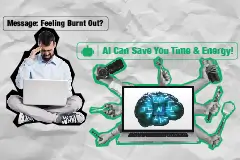4.5 Billion People Lack Healthcare, Here's How AI Could Change That
Imagine rushing to the hospital only to be told, “Sorry, no doctor can see you right now.”
It sounds like a nightmare, but for almost half the world’s population — 4.5 billion people — it’s already a reality. Compounding this issue, a shortage of 11 million health workers is projected by 2030, according to the World Health Organization.
So how will we bridge this immense gap? Artificial Intelligence (AI) is emerging as a promising solution to extend healthcare access and efficiency, especially in underserved regions.
AI offers scalable solutions to enhance diagnostic accuracy, streamline administrative tasks, and optimize resource allocation, potentially revolutionizing how healthcare is delivered globally — especially in underserved regions.
But what does that really mean for you and me?
Why are so many people still dying from preventable illnesses in the age of smart tech?
And how exactly can AI close the healthcare gap without replacing the human touch?
Let’s break it down.
1. The Crisis No One Wants to Talk About
Healthcare shortages aren't just happening in rural villages halfway across the world. They're creeping into busy cities, major hospitals, and even your local clinic. Across the globe: Patients are waiting longer for surgeries. Critical illnesses are being missed because specialists are overwhelmed. Basic services like X-rays or blood tests take days (or weeks) to review. When you realize that even the wealthiest countries are struggling, it becomes clear: We can't just hire more doctors fast enough. We need new tools — and fast.
2. AI: Your Future Emergency Helper
AI is already demonstrating remarkable capabilities in various medical applications, Here's where AI comes in — not to replace doctors, but to extend their reach.
Take brain scans, for example:
AI software developed by UK universities has shown to be twice as accurate as professionals in examining stroke patients' brain scans. Trained on 800 scans and tested on 2,000 patients, the AI not only improved diagnostic accuracy but also identified the timing of strokes, crucial for effective treatment.
Spotting Bone Fractures: Urgent care doctors miss up to 10% of fractures. AI can assist in initial scans, potentially reducing missed diagnoses and unnecessary X-rays. The UK's National Institute for Health and Care Excellence (NICE) deems this technology safe and reliable.
AI can also be used in Assessing Ambulance Needs: In the UK, AI models have been trained to predict the necessity of hospital transfers, correctly identifying cases in 80% of instances. These models analyze factors like mobility, pulse, and oxygen levels, aiding paramedics in making informed decisions.
3. Why This Matters to You and Me
Even in well-equipped urban hospitals, the strain on healthcare systems is palpable. AI can alleviate some of this pressure by:
Early Disease Detection: AI models can detect signs of over 1,000 diseases before symptoms appear. For instance, using data from 500,000 individuals, AI has predicted diseases like Alzheimer's and kidney disease years in advance.
Reducing Readmission Rates: Digital platforms like Huma have shown to reduce hospital readmission rates by 30% and decrease the time clinicians spend reviewing patients by up to 40%, thereby alleviating workloads.
4. Will AI Replace Doctors? (No, But It’ll Save Their Time)
AI is not about replacing healthcare professionals but augmenting their capabilities:
Administrative Efficiency: AI tools like Microsoft's Dragon Copilot can transcribe clinical consultations, reducing the administrative burden on clinicians.
Enhanced Diagnostics: AI assists in analyzing medical images and data, allowing doctors to focus more on patient care rather than routine tasks.
By handling time-consuming processes, AI enables healthcare providers to dedicate more attention to direct patient interactions.
Related sources: 6 ways AI is transforming healthcare
5. The Road Ahead: Smarter Healthcare, But Smarter
Safeguards Too While AI holds immense potential, its integration into healthcare systems must be approached cautiously:
Training and Oversight: Healthcare professionals need proper training to utilize AI tools effectively and understand their limitations.
Data Privacy and Ethics: Ensuring patient data privacy and addressing ethical concerns are paramount as AI becomes more prevalent in healthcare.
Organizations like the World Economic Forum have launched initiatives such as the AI Governance Alliance to promote responsible and inclusive AI systems in healthcare.
6. Bottom Line: In the Future, AI Might Be the Reason You Get the Right Help Fast Enough to Survive
The integration of AI into healthcare is not a distant future concept; it's happening now. With the generative AI healthcare market expected to reach $2.7 billion this year and nearly $17 billion by 2034, the momentum is undeniable.
As AI continues to evolve, it promises to bridge the healthcare gap, ensuring timely and accurate medical assistance for billions worldwide.
For more insights, read the full article: 6 ways AI is transforming healthcare
🤖 Frequently Asked Questions (FAQ)
1. How can AI reduce healthcare costs for underserved communities?
AI-powered diagnostics, telehealth platforms, and automated health screenings can lower operating expenses for clinics and insurers. This helps reduce patient costs while increasing scalability—making quality care affordable and more accessible.
2. Are AI-driven health tools safe to use for diagnosis and treatment?
Yes, many FDA-approved AI health tools now outperform traditional diagnostics in areas like radiology, mental health triage, and diabetes detection. Still, these tools are best used alongside licensed medical professionals.
3. Which AI apps or platforms are helping close the global care gap?
Platforms like Babylon Health, Ada, and Youper offer AI triage, mental health chatbots, and 24/7 remote consultations—often free or low-cost for users in developing regions.
4. Can AI improve rural and remote healthcare services?
Absolutely. AI telemedicine and predictive analytics can track disease outbreaks, optimize emergency response, and offer prescription automation in areas without full-time doctors.
5. Will AI replace human doctors?
No. AI is designed to support doctors, not replace them. It helps with repetitive tasks like data entry, lab result analysis, and symptom screening—freeing up clinicians to focus on complex care and decision-making.
6. What are the risks of using AI in healthcare?
Bias in training data, privacy concerns, and algorithmic errors are real issues. Reputable platforms follow HIPAA compliance and ongoing audits to ensure ethical, safe AI deployment.
7. How can I access affordable AI-powered healthcare today?
Many telehealth services like K Health, MDLIVE, and Lemonaid offer AI-assisted symptom checkers and consultations for a fraction of traditional costs, often even covered by health insurance or employer wellness plans.
Hi, I'm Chelsea Parker, a globetrotter, storyteller, and life enthusiast with a knack for turning everyday experiences into unforgettable lessons. From surviving $20-a-day adventures in Southeast Asia to mastering mindfulness in my daily routine, I share relatable and entertaining tales that inspire you all to explore, grow, and thrive. When i'm not writing, you may find me chasing sunsets, savoring street food, or dreaming up my next big adventure.





